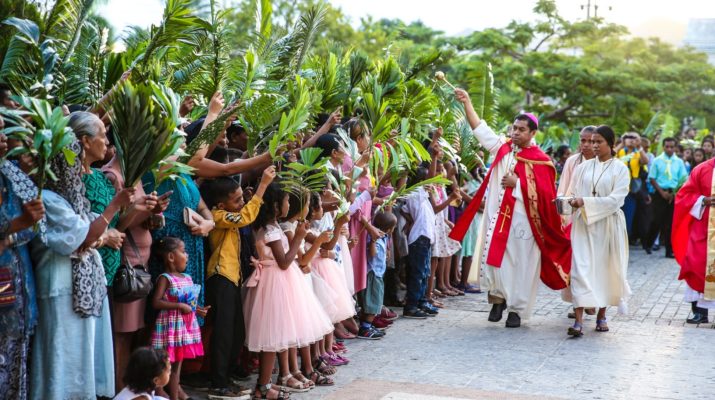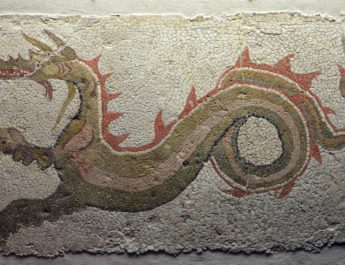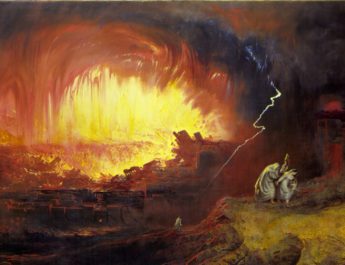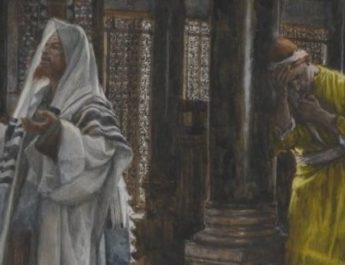Matthew 21:12-17
Tuesday of Holy Week – A Women’s Lectionary
12 Then JesusA enteredB the templeC
A “Jesus” = Iesous. From Hebrew Yehoshua (Joshua, the Lord is salvation); {from YHVH (proper name of the God of Israel; the self-existent and eternal one); {from havah (to become) or from hayah (to come to pass, become, be)} + yasha (to deliver, defend, help, preserve, rescue; properly, to be open, wide or free, which implies being safe. So, in a causative sense, this is to free someone)}. This is Jesus or Joshua in Greek – the Lord saves or the Lord is salvation.
B “entered” = eiserchomai. From eis (to, into, for, among) + erchomai (to come, go). This is to go in in a literal or figurative sense.
C “temple” = hieron. From hieros (sacred, something sacred, temple, holy, set apart; something consecrated to a god). This is the word for temple.
and drove outD allE who were sellingF and buyingG in the temple,
D “drove out” = ekballo. From ek (from, from out of) + ballo (to throw, cast, place, put, drop). This is to throw, put out, produce, expel, banish. It is eject in a literal or figurative sense.
E “all” = pas. This is all or every.
F “selling” = poleo. This is to barter or sell. It can also refer to the thing that is sold.
G “buying” = agorazo. From agora (assembly, forum, marketplace, town square, thoroughfare); from ageiro (to gather). This is to go and buy something at market with a focus on goods being transferred. It can also mean to purchase or redeem.
and he overturnedH the tablesI of the money changersJ and the seatsK of those who sold doves.L
H “overturned” = katastrepho. 2x in NT– both in reference to the money changers’ tables. From kata (down, against, throughout, among) + strepho (to turn, change, turn back, be converted; to turn around completely to take the opposite path or a completely different one); {from trope (turning, shifting, a revolution; figuratively, a variation); from trepo (to turn)}. This is to overturn literally or figuratively – to be upside down, overthrow or ruin.
I “tables” = trapeza. 15x in NT. Probably from tessares (four; figuratively, can mean total inclusion or universality) + peze (by foot or land) or pezos (by foot or land); {from pous (foot)}. This is a table – whether for eating or conducting business. Literally, four feet. This is where the word “trapeze” comes from.
J “money changers” = kollubistes. 3x in NT– all in reference to the money changers’ tables. From kollubos (a small coin); probably related to kollourion (a salve or poultice for the eye); see kollurion (bread roll or a poultice for the eye in that shape); {probably from kollix (bread roll) or kollao (to glue together; joining, spending time with, or being intimately connected to; can be used for marriage, joining the church, clinging, or adhering to something; can also be used medically for uniting wounds); {from kolla (glue)}}. This is one who deals in coins – a money changer who exchanged Gentile currency for Jewish.
K “seats” = kathedra. 3x in NT. From kata (down, against, according to, among) + the same as hedraios (sitting, well-seated, immovable; figuratively, steadfast, firm, morally fixed); {from hedra (seat)}. This a seat or bench in a literal or figurative sense. This is the root of “cathedral.”
L “doves” = peristera. 10x in NT. This is dove or pigeon.
13 He said to them, “It is written,M
‘My houseN shall be calledO a house of prayer’;P
M “written” = grapho. This is to write or describe. It is where the word “graphic” comes from.
N “house” = oikos. This is house – the building, the household, the family, descendants, the temple.
O “called” = kaleo. Related to keleuo (to command, order, direct); from kelomai (to urge on). This is to call by name, invite, to name, bid, summon, call aloud.
P “prayer” = proseuche. From proseuchomai (to pray or pray for, to worship or supplicate; more literally exchanging one’s own wishes for God’s); {from pros (advantageous for, at, toward) + euchomai (to wish, make a request, pray)}. This is prayer, worship, or a place where one prays.
but you are makingQ it a denR of robbers.”S
Q “making” = poieo. This is to make, do, act, construct, abide, or cause.
R “den” = spelaion. 6x in NT. From speos (cave, grotto). This is a cavern, which implies a place to hide. So, this word can also mean den or hideout. This is the word used for “den of robbers” in Matthew 21:13. Also, this is where the word “spelunk” comes from.
S “robbers” = lestes. 15x n NT– 3x “you are making [my house] a den of robbers” when Jesus cleanses the temple, 3x of Jesus’ arrest “did you come for me…as though I were a bandit?”; 3x of bandits crucified on Jesus’ left and right; 2x of the man falling into the hands of robbers in the Good Samaritan parable; 2x of the Good Shepherd speech (anyone who doesn’t come in by the gate is a bandit) in John 10:1, 8; 1x of Barabbas as a bandit; and 1x Paul writes he is in danger from bandits. From leis (booty); from leizomai (to plunder). This is a bandit or thief – one who steals by violence/force out in the open as opposed to by stealth. These were part of armed gangs.
14 The blindT and the lameU cameV to him in the temple, and he curedW them.
T “blind” = tuphlos. Derivation unclear. Perhaps from tuphoo (to be conceited, foolish, puffed up, haughty; properly, to blow smoke; figuratively being muddled or cloudy in mind; poor judgment that harms spiritual clarity; also, being covered with smoke – so filled with pride); from tuphos (smoke, vanity, arrogance); from tupho (to raise smoke, smolder, slowly consume without flame). This is blind or a blind person – perhaps in the sense of smoke making things opaque and impossible to see. This is blind literally or figuratively.
U “lame” = cholos. 14x in NT. This is lame or limping. It can also mean missing a foot.
V “came” = proserchomai. Related to “entered” in v12. From pros (for, at, towards) + erchomai (see note B above). This is to approach, draw near, come up to. It is also used figuratively to mean worship.
W “cured” = therapeuo. From therapon (servant, attendant, minister); perhaps from theros (properly heat and so used for summer); from thero (to heat). This is to serve, care, attend, heal, or cure. Since it means to attend to, it can be used for doctors, but also for those who serve God. So, it can mean worship. This is where the word “therapy” comes from.
15 But when the chief priestsX and the scribesY sawZ the amazing thingsAA that he did,BB
X “chief priests” = archiereus. Related to “temple” in v12. From archo (to rule, begin, have first rank or have political power) + hiereus (a priest literal or figurative – of any faith); {from hieros (see note C above)} This is a high or chief priest.
Y “scribes” = grammateus. Related to “written” in v13. From gramma (what is drawn or written so a letter of the alphabet, correspondence, literature, learning); from grapho (see note M above). This is a writer, scribe, or secretary. Within Judaism, it was someone learned in the Law, a teacher. Also used in the Bible of the town-clerk of Ephesus. See Sirach 38:24-39:11 for a lengthier, positive passage about who scribes were and what they meant in society.
Z “saw” = horao. To see, perceive, attend to, look upon, experience. Properly, to stare at and so implying clear discernment. This, by extension, would indicate attending to what was seen and learned. This is to see, often with a metaphorical sense. Can include inward spiritual seeing.
AA “amazing things” = thaumasios. 1x in NT. From thauma (a wonder or marvel; used abstractly for wonderment or amazement; something that evokes emotional astonishment); may be from theaomai (to behold, look upon, see, contemplate, visit); from thaomai (to gaze at a spectacle; to look at or contemplate as a spectator; to interpret something in efforts to grasp its significance). This is wonderful, something remarkable. It is a miracle that moves people on a personal level – whether to wonder or being indignant.
BB “did” = poieo. Same as “making” in v13. See note Q above.
and heard the childrenCC crying outDD in the temple, “HosannaEE to the SonFF of David,”GG they became angryHH
CC “children” = pais. Perhaps from paio (to strike or sting). This is child, youth, servant, or slave.
DD “crying out” = krazo. This is to cry out, scream, shriek. It is onomatopoeia for the sound of a raven’s call. Figuratively, this means crying out urgently without intelligible words to express something that is deeply felt.
EE “Hosanna” = hosanna. Related to “Jesus” in v12. 6x in NT. From Hebrew yasha (see note A above) + na (particle used for requests or for urging; can be we pray, now, I ask you, oh). This is Hosanna – save, we pray. It started as a call for help, but later became a cry of happiness (anticipating the help coming). It can be save now, please save, or oh, save.
FF “Son” = huios. This is son, descendant – a son whether natural born or adopted. It can be used figuratively for other forms of kinship.
GG “David” = Dauid. From Hebrew David (David); from the same as dod (beloved, love, uncle); the root may mean to boil, which is used figuratively to describe love. So, this implies someone you love such as a friend, a lover, or a close family member like an uncle. David’s name likely means something like “beloved one.”
HH “became angry” = aganakteo. 7x in NT. Perhaps from agan (much) + achthos (grief); {related to agkale (bent arm); from agkos (bend, ache)}. This is being greatly grieved or displeased. Generally translated angry or indignant.
16 and said to him, “Do you hearII what these are saying?”
Jesus said to them, “Yes;JJ have you never read,KK
II “hear” = akouo. This is hear or listen, but it also means to understand by hearing. This is where the word “acoustics” comes from.
JJ “yes” = nai. This is yes, truly, indeed. It is a strong affirmation.
KK “read” = anaginosko. From ana (upwards, up, again, back, anew) + ginosko (know, recognize, learn from firsthand experience). This is literally to know again – to recognize, read, or discern.
‘Out of the mouthsLL of infantsMM and nursing babiesNN
you have preparedOO praisePP for yourself’?”
LL “mouths” = stoma. Perhaps from tomoteros (sharp, keener); from temno (to cut). This is mouth, speech, language, the tip of a sword, an opening in the ground.
MM “infants” = nepios. 15x in NT– used in 1 Corinthians 13 (“when I was a child…”). This may be from ne (not) + epos (word; by extension, to speak) {from epo (to answer, bring word, command). This is an infant, child, minor, or immature person. It can also be used figuratively for someone who is childish or unlearned.
NN “nursing babies” = thelazo. 5x in NT. From thele (a nipple). This is to nurse or suckle – a nursing baby.
OO “prepared” = katartizo. 13x in NT. From kata (down, against, throughout, among) + artizo (get ready, prepare); {from artios (perfect, complete, ready, adequate, fitted); from arti (now, in the moment); from airo (raise, take up, lift, remove)}. This is to prepare, complete, perfect for final use. This is restoring something to a good condition, whether for the first time or one more. It is to repair in a literal or figurative sense.
PP “praise” = ainos. 2x in NT. Perhaps from epainos (fitting praise, fame, approval; recognizing something or someone that is deserving of praise.); {from epi (on, upon, to, what is fitting) + aineo (to praise, praise God)}. This is praise, a story praising God.
17 He leftQQ them, wentRR out of the citySS to Bethany,TT and spent the nightUU there.
QQ “left” = kataleipo. From kata (down, against, throughout, among) + leipo (to leave behind, remain, lack, abandon, fall behind while racing). This is to leave or leave behind, abandon, forsake, leave in reserve.
RR “went” = exerchomai. Related to “entered” in v12 & “came” in v14. From ek (from, from out of) + erchomai (see note B above). This is to go out, depart, escape, proceed from, spread news abroad.
SS “city” = polis. This is a city or its inhabitants. It is a town of variable size, but one that has walls. This is where “metropolis” and “police” come from.
TT “Bethany” = Bethania. 12x in NT. From Aramaic beth anya (house of affliction, misery, wretchedness). This is Bethany.
UU “spent the night” = aulizomai. 2x in NT. From aule (to inquire, question, examine precisely, test with questions); {from ek (from, from out of) + etazo (to examine)}. This is to spend the night, lodge, abide.
Image credit: “Palm Sunday in East Timor” by J. F. Guterres, 2019.




